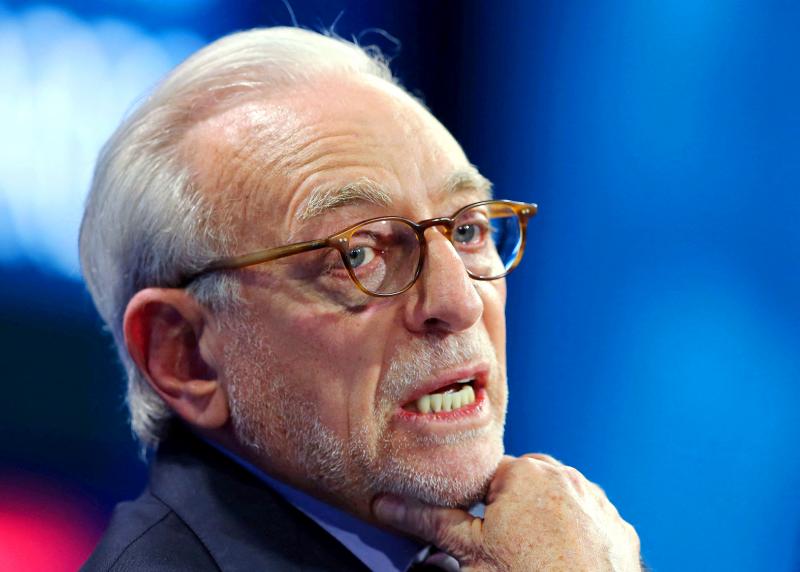A stake that Nelson Peltz’s activist hedge fund has built in Unilever PLC is adding to pressure on the Dove soap maker’s CEO Alan Jope, after Jope’s failed bid to buy a consumer-health unit from GlaxoSmithKline PLC.
Peltz’s Trian Fund Management has bought a significant stake in London-based Unilever over the past few months, according to people familiar with the matter, who asked not to be identified because the plans are private.
The size of the stake or Peltz’s intentions could not be immediately learned.

Photo: Reuters
Trian, which was co-founded by Peltz, Ed Garden and Peter May, has a history of pushing for changes at consumer companies, including PepsiCo Inc, Danone SA, Kraft Foods Inc and others.
The emergence of an activist investor is the latest challenge for Jope, who is reeling from the failed GSK purchase and faces growing pressure to deliver a new strategy.
Billionaire Peltz is turning his attention to Unilever after retiring from Procter & Gamble Co’s board in August last year after nearly four years that brought several dramatic changes aimed at improving that consumer-goods giant’s performance.
“The fox would now appear to be inside the henhouse,” Jefferies analysts led by Martin Deboo wrote on Sunday. “The force and temperature of debate around Unilever now look set to rise by several notches.”
Trian is expected to argue for splitting Unilever’s food business from its household and personal care operations, Deboo wrote, and “further increase the pressure” on Jope and the board.
Unilever shares recorded their worst weekly loss since the peak of the pandemic sell-off in March 2020, after it confirmed on Sunday last week that it offered £50 billion (US$67.7 billion) for the GSK healthcare unit, which includes brands such as Advil and Sensodyne. GSK rejected the bid as too low, and Unilever later said it had no plans to raise the offer.
GSK has its own activist investor in the mix, with Elliott Investment Management Corp pushing for changes.
Jope’s public defeat came after analysts implored him not to pursue the Glaxo unit. Fund manager Terry Smith called the GSK bid a “near-death experience.”
Only days earlier, Smith had urged Unilever to focus more on fixing its own business rather than seeking to promote the sustainability ethos of brands such as Hellmann’s mayonnaise.
It remains to be seen whether Jope’s setback with GSK will prompt the kind of radical changes implemented at Unilever after Kraft Heinz Co’s failed bid to acquire Unilever in 2017 for US$143 billion. That situation led Unilever to consolidate its headquarters in the UK, ditch a cumbersome Anglo-Dutch structure and adopt a more aggressive acquisition strategy.

CAUTIOUS RECOVERY: While the manufacturing sector returned to growth amid the US-China trade truce, firms remain wary as uncertainty clouds the outlook, the CIER said The local manufacturing sector returned to expansion last month, as the official purchasing managers’ index (PMI) rose 2.1 points to 51.0, driven by a temporary easing in US-China trade tensions, the Chung-Hua Institution for Economic Research (CIER, 中華經濟研究院) said yesterday. The PMI gauges the health of the manufacturing industry, with readings above 50 indicating expansion and those below 50 signaling contraction. “Firms are not as pessimistic as they were in April, but they remain far from optimistic,” CIER president Lien Hsien-ming (連賢明) said at a news conference. The full impact of US tariff decisions is unlikely to become clear until later this month

GROWING CONCERN: Some senior Trump administration officials opposed the UAE expansion over fears that another TSMC project could jeopardize its US investment Taiwan Semiconductor Manufacturing Co (TSMC, 台積電) is evaluating building an advanced production facility in the United Arab Emirates (UAE) and has discussed the possibility with officials in US President Donald Trump’s administration, people familiar with the matter said, in a potentially major bet on the Middle East that would only come to fruition with Washington’s approval. The company has had multiple meetings in the past few months with US Special Envoy to the Middle East Steve Witkoff and officials from MGX, an influential investment vehicle overseen by the UAE president’s brother, the people said. The conversations are a continuation of talks that

CHIP DUTIES: TSMC said it voiced its concerns to Washington about tariffs, telling the US commerce department that it wants ‘fair treatment’ to protect its competitiveness Taiwan Semiconductor Manufacturing Co (TSMC, 台積電) yesterday reiterated robust business prospects for this year as strong artificial intelligence (AI) chip demand from Nvidia Corp and other customers would absorb the impacts of US tariffs. “The impact of tariffs would be indirect, as the custom tax is the importers’ responsibility, not the exporters,” TSMC chairman and chief executive officer C.C. Wei (魏哲家) said at the chipmaker’s annual shareholders’ meeting in Hsinchu City. TSMC’s business could be affected if people become reluctant to buy electronics due to inflated prices, Wei said. In addition, the chipmaker has voiced its concern to the US Department of Commerce

STILL LOADED: Last year’s richest person, Quanta Computer Inc chairman Barry Lam, dropped to second place despite an 8 percent increase in his wealth to US$12.6 billion Staff writer, with CNA Daniel Tsai (蔡明忠) and Richard Tsai (蔡明興), the brothers who run Fubon Group (富邦集團), topped the Forbes list of Taiwan’s 50 richest people this year, released on Wednesday in New York. The magazine said that a stronger New Taiwan dollar pushed the combined wealth of Taiwan’s 50 richest people up 13 percent, from US$174 billion to US$197 billion, with 36 of the people on the list seeing their wealth increase. That came as Taiwan’s economy grew 4.6 percent last year, its fastest pace in three years, driven by the strong performance of the semiconductor industry, the magazine said. The Tsai